This 95-Year-Old Won an Innovation Award for Introducing Carrots to Gujarat in 1943
Since then, he, along with his family, has been working for conservation and development of this variety.

Vallabhbhai Vasrambhai Marvaniya, a 95-year-old carrot farmer from Khamdhrol village of Junagadh district of Gujarat, was one of the recipients of 9th National Grassroots Innovation Award this year.
His story started back in 1943 when he was around 13. Vallabhbhai had to leave his education after class 5 to help his father in his 5-acre farm where pulses, grains and groundnut were grown to sell,and maize, jowar, rajko (a kind of grass meant for fodder) and carrot was grown to feed the cattle. No one in Gujarat knew back then that these grains and vegetables could also be consumed by humans.
However, while feeding the fodder to the cattle, once Vallabhbhai also tried some carrot and found it very tasty. He then suggested to his father that they should sell the surplus carrot in their farm.
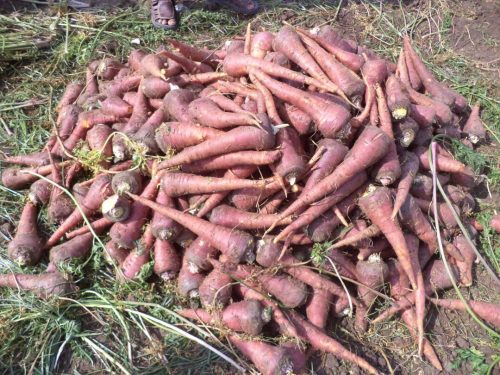
But his father found this idea very funny as carrot was only considered fodder for cattle back then and he ignored Vallabhbhai’s suggestion. But Vallabhbhai was so sure about this that he himself dug out the carrots and took them to the market to sell.
As a young boy, it was hard for him to take them out from the ground without any help but he did not give up. He took two gathri (sacks) of carrots to the market and asked one of his regular customers to taste it. The customer loved the taste and bought one sack, which was almost 5 kg, for Rs 4. He also brought another customer who bought the other sack too. Vallabhbhai earned Rs 8 from his first lot of carrots.
“Those days, even 50 paise was too much money for us. My father was surprised to see an extra Rs 8 when I handed over the day’s earnings. He thought that people might have returned the money for the vegetables taken on credit. When I told him that this is the money earned by selling carrot, he could not believe it. Rs 8 was something we could not even earn in entire month sometimes,” says Vallabhbhai.
“I would give 25 paise to the tangawala to go to the market, that day while coming back home I gave him 50 paise. He was so happy, I can’t forget his face,” laughs Vallabhbhai.
After this, his father supported him to grow and sell carrot. People would also approach them to buy this new vegetable that they had only heard of. A vegetable that was sweet, strong and could even be eaten raw? People loved it!
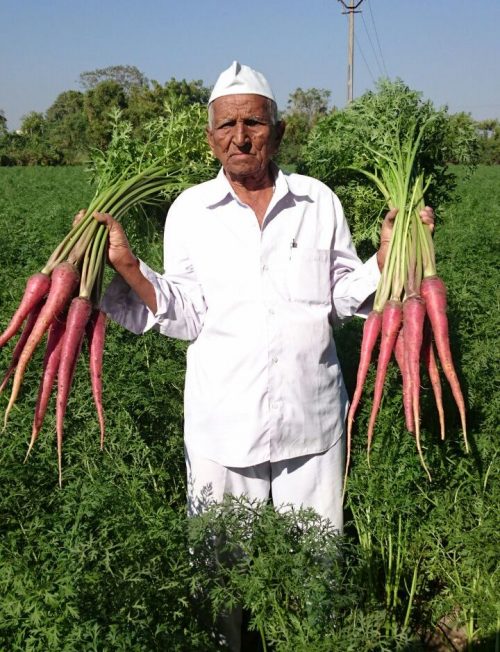
However,a few complained about the branches that had to be cleaned before consuming the carrot. Vallabhbhai then started working on reducing these branches so that the vegetable grew straight into the soil. He applied various methods of sowing and watering to achieve this goal. He would also extract the carrots carefully from the soil to keep the shape intact.
Soon, word spread and the Nawab of Junagadh, Muhammad Mahabat Khan III came to know about this wonder vegetable.Life took a turn from here and Vallabhbhai became the regular supplier of carrots for the langars at the Nawab’s palace. However, after the partition of India and Pakistan, Mahabat Khan left Junagadh and settled in Karachi and Vallabhbhai had to depend on the market for his earnings.
“The Nawab of Junagadh still has to give me Rs 42 for my carrots,” he laughs.
But within this short span of four years, carrot farming brought immense prosperity to Vallabhbhai and his brothers.
In the coming years, he also adopted drip irrigation and mulching methods in his farm and slowly expanded his farms from 4 acres to 40 acres.
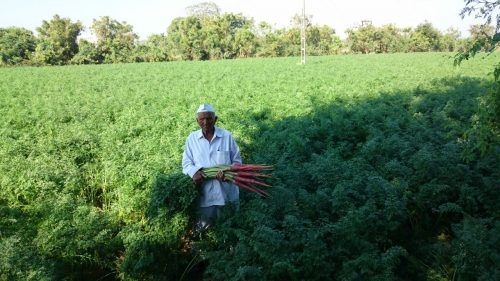
His methods also made the carrots’ quality better day by day. Hence, though his yield was good there was a huge demand for these carrots in the market. Vallabhbhai then thought of growing the seeds of his variety of carrots and started distributing them to other farmers. He selected best plants for seed production and grew them in a small area.
With time, the demand for the seeds also increased. And so by 1985 he started growing seeds on large scale and named the variety as Madhuvan Gajar.
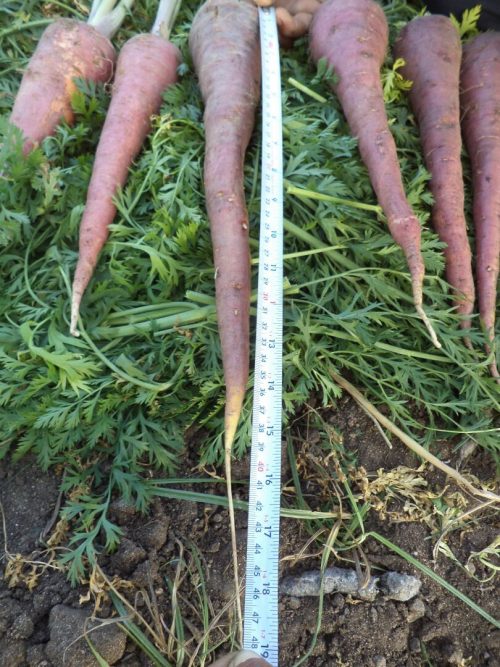
“When we planted the carrot seeds all over and it started flowering there were lakhs of honey-bees visiting our farm, so my father named the variety Madhuvan,” says Arvindbhai, Vallabhbhai’s son.
Since then, he, along with his family, has been working for conservation and development of this variety.
The average yield of Maduvan Gajar is 40-50 tonnes/hectare and is cultivated in Gujarat, Maharashtra and Rajasthan successfully.
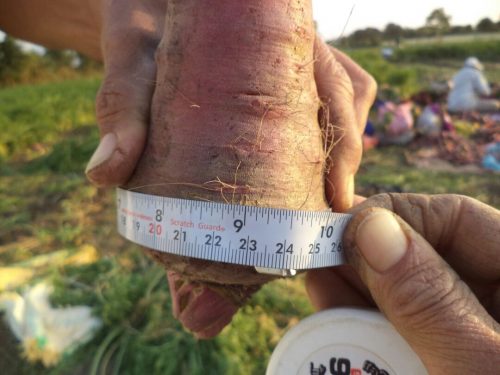
During Kharif 2016-2017, National Innovation Foundation (NIF) India conducted validation trials for this variety at Rajasthan Agricultural Research Institute (RARI), Jaipur.Madhuvan Gajar carrot variety was found to possess a significantly higher root yield (74.2 t/ha) and plant biomass (275 gm per plant). During 2016-2017, a trial was conducted at farmers’ fields by NIF in different states like Gujarat, Maharashtra and Rajasthan; the reports showed that the performance of Madhuvan Gajar carrot variety was excellent in terms of yield. The variety is also used for various value added products like carrot chips, juices and pickles.
At 95 now, Vallabhbhai still visits his farm twice a week, and his son Arvindbhai and his family work under his guidance.
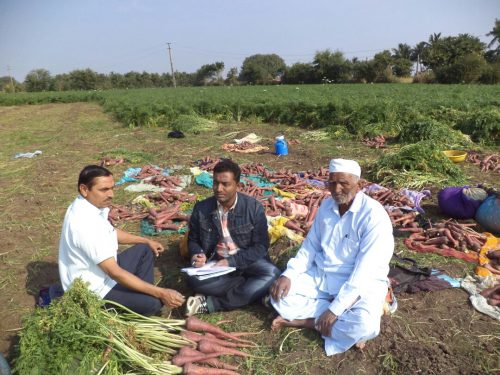
The family has not recruited any labour and the entire process of growing to packaging of the seeds is done by the members alone. Arvindbhai says that the family earns approximately Rs 1 lakh from 1 acre of carrot farming and are more than happy to guide any farmer who visits their farm. Villabhbhai has also penned a booklet to give to any farmer visiting the Madhuvan farm.
Vallabhhai has received various awards and recognition for development and promotion of Madhuvan Gajar carrot variety and was recently conferred with the 9th National Grassroots Innovation Award by the President of India at Rashtrapati Bhavan.
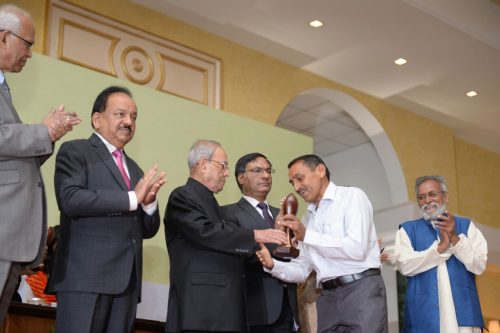
On the basis of his experience of more than 6 decades, Vallabhbhai suggests that every farmer should grow carrots to improve their yield.
“I have observed that after you harvest carrot and grow groundnut or cotton on the same farm then these crops don’t catch fungus and other plant diseases,” he says.
He urges agri-scientists to innovate more value-added products from carrots, which are a rich source of beta carotene and sugar.
To order Madhuvan Gajar seed or to know more about Vallabhbhai and his work you can call on 9377635148
Like this story? Or have something to share? Write to us: [email protected], or connect with us on Facebook and Twitter.
NEW: Click here to get positive news on WhatsApp!
This story made me
- 97
- 121
- 89
- 167
Tell Us More
We bring stories straight from the heart of India, to inspire millions and create a wave of impact. Our positive movement is growing bigger everyday, and we would love for you to join it.
Please contribute whatever you can, every little penny helps our team in bringing you more stories that support dreams and spread hope.



















